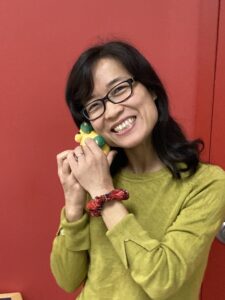 Yangling Wang – Scientist, FireCyte Therapeutics
Yangling Wang – Scientist, FireCyte Therapeutics
Q: What kind of work do you do at FireCyte?
Yangling: We study neurodegenerative disease in the eye. Basically, I use cultured cells, cell lines and also some pluripotent stem cells and we mimic the neurodegenerative condition. Then, we give our treatment drug and see if we can rescue it. I work primarily with neuron cells.
Q: How long have been working with neuron cells?
Just since I joined FireCyte. Before I was working a lot with cells and mouse models but metabolism related. Specifically, obesity, and non-alcoholic fatty liver disease, then, alcoholic hepatitis. There’s actually a lot in common between that and my current work.
Q: Where did you work before FireCyte?
I was at Tuft’s Medical Center in downtown Boston for three years before I came here. Also, I was at the National Institute of Health in Maryland, post-doctoral.
Q: Where did you get your PhD?
I got my PhD from Stockholm University in Sweden.
Q: How did you like Sweden?
It was a really great experience. I didn’t want to leave, but it’s difficult to find a job there. Also, I had to leave because I was using a scholarship from the Chinese Scholarship Council so I had to go back for two years. Stockholm is really beautiful city, it’s actually similar to Boston. You can find water anywhere which I really love. I can’t swim but I like seeing water.
The lab I working at was very international. I worked with people from all over Europe and even some Americans. I really enjoyed working with all of those different people.
Q: What has been your biggest accomplishment professionally?
It hasn’t been published, but at NIH my work found a really dramatic effect from TGF beta signaling. There had already been a publication before that which confirmed what I found, but I was really impressed with myself and it was a lot of fun working with the beta signal pathway.
Q: What do you like best about science?
There is always some difficulty in the beginning, both technically and biologically. There’s always challenge. It’s really difficult to have something work immediately because there are different conditions and even though you read the literature, there are just a thousand variables that you can’t just include in a paper. You have to explore it yourself. That feeling of accomplishment from trying different conditions until something works is what I like best.
Q: Do you think of yourself primarily as a cell biologist?
Yes, I would say so.
Q: What is it about cell biology that speaks to you?
It’s the mechanism that you can get a lot of information from cell biology. And that it may not necessarily apply to the whole physiological or pathological level, because the whole body is more complicated, but the advantage of cells is that you can get the direct effect.
There are a lot of questions that can be easily answered using cells. With cells there’s concern at the ethical level like there is when working with people or animals. Also, when you work with cells, you most likely will get an answer. That will be a clear “yes” or “no” unlike working with animals where there is a layer of uncertainty because they are so complex.
Q: What do you like to do outside of work?
I used to play badminton a lot when I was in Sweden.
Q: Do you prefer hamburgers or hotdogs?
I like the taste of hotdogs more.
Q: Mustard or ketchup?
Mustard.
Q: What’s your favorite movie?
Just drama types, any drama I could keep watching.
Q: Who would you pick to play you in a movie?
A quiet, nerdy type – someone peaceful and a little bit of an ‘in her own world’ type of person.
Q: Do you prefer the beach or the mountains?
I like the beach better. I just like looking at the water because it makes me feel relaxed.
